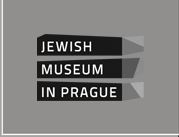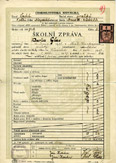
| My name is Martin and I was born in Prague. |

|
| This is my father Julian. |

|
| These are my grandparents from my mother’s side. |
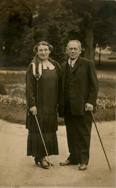
|
| And this is me with my mother and my brother John who was seven years older than me. |

|
I finished attending school in my third class and the last subject of matter in Czech was the „i and y“ words.
When I went out on the street to play with my friends as I used to do in the past, some of them started shouting at me: „you stingy Jew“! As a result of those insults I stayed at home for two years. This feeling of loneliness and isolation was probably worse than my life in Terezín where I had friends.
 My whole family and I arrived in Terezin on 16th April 1942, two months before my eleventh birthday. We were all naive to believe that the war would end soon and by my eleventh birthday we would return home. This faith helped me to overcome the sorrows of our miserable existence there.
My whole family and I arrived in Terezin on 16th April 1942, two months before my eleventh birthday. We were all naive to believe that the war would end soon and by my eleventh birthday we would return home. This faith helped me to overcome the sorrows of our miserable existence there.Right after our arrival at Terezín I found myself in a sanitary room. When I was released about ten days later I felt weak so I was allowed to go with the children from the kindergarten to the rampart. It was at the beginning of May and the dandelions were blooming and the grass was growing. Maybe the birds and butterflies were flying and singing too. I do not think there were any trees, only bushes, but they had new leaves so there was greenery everywhere. Compared to the hollow life in the barracks and after a year of not being allowed on the streets of Prague on my own, or even to the park, I found this a complete miracle.
In Heim
After coming back from the sanitarium I went to a children’s home (Kinderheim – Heim for short). These were 236 Hamburg barracks where boys between the ages of nine and twelve were quartered. I was one of the oldest. At the end of our corridor was Heim 233 for smaller boys and next to us there was a room 234-235 where mothers with small children were quartered.
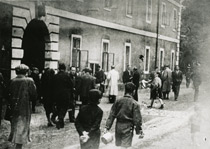 My mom used to live in the same barracks along with other women so she could come every morning to see me. She worked in agriculture during her whole stay in Terezín. They planted vegetables and because the Germans needed this production, my mom was protected from transportation along with children under the age of 14. That way I was protected as well, because at the moment of the last transport I had not reached the age limit of 14 yet. However, my brother and my father were deported to Auschwitz from where my dad never came back.
My mom used to live in the same barracks along with other women so she could come every morning to see me. She worked in agriculture during her whole stay in Terezín. They planted vegetables and because the Germans needed this production, my mom was protected from transportation along with children under the age of 14. That way I was protected as well, because at the moment of the last transport I had not reached the age limit of 14 yet. However, my brother and my father were deported to Auschwitz from where my dad never came back.In Heim, opposite the main door, there were two windows and between them along the wall, a closet for our personal things such as mess tins, spoons, washing necessities, writing materials, books and other things. On one side, there were no bunk beds so we could create our own so-called square where we were writing, drawing and also learning. Mr. Eberson used to teach us subjects such as basic math and geography. There was a corridor near the window between the bunk beds where we put board and transformed it into a field for button football. The players consisted of all kinds of buttons. The goalkeeper was the half of a heavy ladies button, the defenders were heavy buttons, midfielders were middle-sized buttons filed away on one side so they would have the ability to catch hold of from underneath and centre forward. We used a fly front button as a ball.
We had to deal with fleas and bedbugs in Heim which gave us a hard time. We found fleas more annoying, because they could jump and were hard to catch. Soon we learnt to kill them quite easily and tear them apart between our fingers. Catching fleas became a fixed part of our daily routine. I think it was between 7: 20 and 7: 30 a.m. along with other chores such as washing, making beds, and examining ears whether they were dirty or not. The record was held by one boy who was able to catch 28 fleas during one morning.
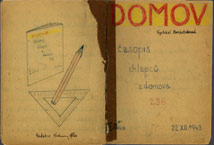 From December 1943 to May 1944, me and my friend Petr Seidemann published ten issues of the magazine Domov (“Home”) at Home 236 in the Hamburg Barracks and later at ‘Number 2’ in the ‘School’ at L 417.
From December 1943 to May 1944, me and my friend Petr Seidemann published ten issues of the magazine Domov (“Home”) at Home 236 in the Hamburg Barracks and later at ‘Number 2’ in the ‘School’ at L 417.Later in Terezín I got infected with jaundice and found myself again in the sanitarium. There I witnessed a heartbreaking scene where a grandmother, who was transported east, came to say goodbye to her little granddaughter. It was a real grandmother with a headscarf and she cried very much and was kissing the girl feeling that she would never see her again. The girl smiled and called her Onubaba. Eventually, they had to take the grandmother away
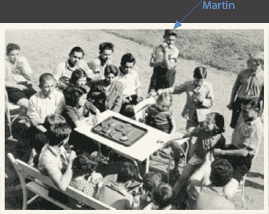 On 8th of June I left for a sanatorium at the chateau Kamenice near Prague. This was initiated by a known philanthropist
Přemysl Pitter. Very small children were placed in the Lojovice chateau. It was admirable that only one month after the end of the war, it was possible to establish a sanatorium for us. For a certain period of time, the girls and boys were living together and later, we were moved to a nearby chateau called Štiřín. We went for trips together and later also swimming and were excited by the prospect that after a long time spent in Terezín we will be able to enjoy absolute freedom.
On 8th of June I left for a sanatorium at the chateau Kamenice near Prague. This was initiated by a known philanthropist
Přemysl Pitter. Very small children were placed in the Lojovice chateau. It was admirable that only one month after the end of the war, it was possible to establish a sanatorium for us. For a certain period of time, the girls and boys were living together and later, we were moved to a nearby chateau called Štiřín. We went for trips together and later also swimming and were excited by the prospect that after a long time spent in Terezín we will be able to enjoy absolute freedom.One day while staying in Štiřín I received a letter written in a familiar handwriting:
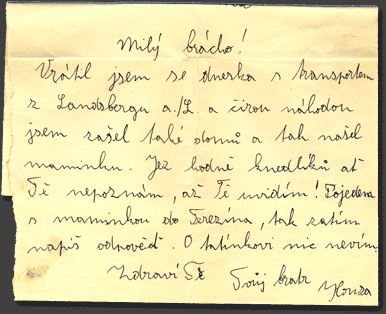
My dear brother!
Today I returned with the transport from Landsberg and I happened to go home where I found our mom. Eat a lot of dumplings so I won’t be able to recognize you when I see you! We are leaving with mum for Terezín so write back in the meantime. I do not know anything about dad.
Regards,
Your brother John
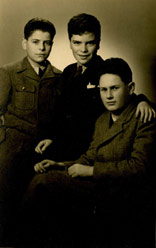 When I came back after the war I was trying to start an ordinary life. It was slow and difficult. It seemed like my life was just beginning even though I was already fourteen years old. Later I was confronted with a repeating vision that I was in front of my friends from Terezín who were no longer alive and there was not even an urn with an ash left after them. They were asking me about the way I was living and whether I deserved to live and was aware I lived for them as well.
When I came back after the war I was trying to start an ordinary life. It was slow and difficult. It seemed like my life was just beginning even though I was already fourteen years old. Later I was confronted with a repeating vision that I was in front of my friends from Terezín who were no longer alive and there was not even an urn with an ash left after them. They were asking me about the way I was living and whether I deserved to live and was aware I lived for them as well.Martin Glas died on August 31, 2008
